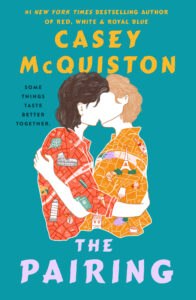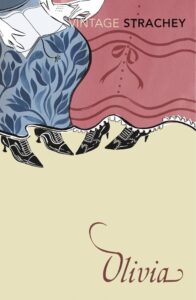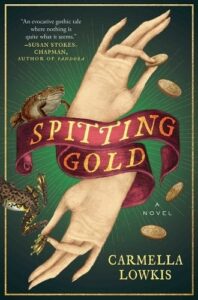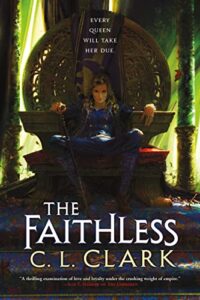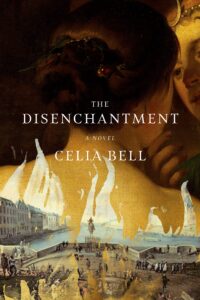Buy this from Bookshop.org to support the Lesbrary and independent bookstores!
[I] wonder if heartbreak will fuck you if you learn to love it enough.
It feels unnecessary to recommend the new Casey McQuiston romance, given how incredibly popular Red, White, and Royal Blue and One Last Stop are. I’m sure this will also get a ton of press and publicity. But I just can’t help it: I loved this book. 2024 has been an incredible romance reading year for me — all of my top three romance books I’ve ever read came out this year. The Pairing (August 6, 2024) is a decadent, sensual trip through food, wine, Europe, and a very queer bi4bi (M/NB) relationship.
Theo and Kit were best friends who grew up together and then started dating. Their lives were completely intertwined until they had a huge fight during their flight to their dream vacation, a food- and wine-tasting guided tour through France, Spain, and Italy. As soon as their plane landed, they went their separate ways and haven’t seen each other since. The tour, though, was nonrefundable, and four years later, the voucher is about to expire. So, Theo books the trip in the last month possible… and then arrives to find that Kit had the same idea, and they’re stuck together for the next three weeks. Along the way, they make a bet about who can sleep with the most people during the trip, but despite the distractions, Theo is having trouble suppressing those familiar feelings resurfacing for Kit.
Let me start here: The Pairing is such a great representation of the queerness of bisexuality. (If you’re not a fan of any depictions of bisexuals being promiscuous, you can skip this one, but it’s all consensual and there’s no cheating.) Not only are both of them sleeping with people of any gender, but I also was charmed by Theo and Kit discovering that after four years, despite having different genders, they have almost identical hairstyles and outfits. Amazing. (Theo is nonbinary, but we don’t find that out until well into the book.) I love these bisexual sluts. (As they self-identify—in fact, the working title of this book was Sluts in Europe.)
While the competition is a good way to pitch this book, it’s really not the focus. Instead, it’s about Theo and Kit’s tenuous new friendship—specifically, the yearning. THE YEARNING. This is such an interesting set up of best friends to lovers to exes to second chance romance. They know each other so well—but they also don’t know anything about the last four years in their lives, and they’ve both changed considerably. They’ve slept together countless times, but the sexual tension is unparalleled. It’s very obvious to the reader—both because we know this is a romance novel and because it’s obvious to absolutely everyone but the two of them—that they’re falling for each other again, but they both think it’s one sided, which leads to them doing things like making out with other people while holding eye contact with each other. And then pretending it doesn’t mean anything!! Absolutely ridiculous. (Which I mean as a compliment.)
The tension and sexcapades through Europe is decadent enough, but Theo is also an aspiring sommelier and Kit is a professional pastry chef. They take their food and drinks very seriously, which means it’s described in mouth-watering detail. And that’s not even counting traveling through some of the most beautiful locales in Europe. The sex, food, travel, and tension give this such a decadent, luxurious, almost overwhelming mood. Read this while eating chocolate truffles and lounging poolside.
And then, of course, there’s the romance. I’m used to dual point of view romance novels alternating between them, but The Pairing is a little difference. We get Theo’s POV in the first half and Kit’s afterwards, meaning we watch Theo reluctantly fall back in love with Kit while thinking he doesn’t feel the same way. Theo worked very hard to try to get over him, but they were never able to completely put it behind them, feeling like relationships weren’t worth trying again: “The thought of starting from scratch, the ordeal of rebuilding something I already spent my whole life building with someone else—it’s exhausting. It’s a fucking Olympic triathlon of mortifying vulnerability, and at the end, I might not even like them as much as I liked Kit.”
I know enemies to lovers is the more popular trope, but I think best friend to lovers is severely underrated, and this couple shows why. It shows what it’s like to be known and loved for every part of you, for all the sedimentary layers of who you once were and who you have become. It’s being loved by someone who knows every facet of you, who’s seen the worst of you.
Part of what I loved so much about this book is the second half, Kit’s section, so I have to include a spoiler paragraph here. (Even though it’s not really a spoiler, because you know which genre you’re reading.)
(Spoilers, highlight to read.) It is so effective to go from Theo’s reluctant, hesitant falling back in love to Kit’s perspective, who never stopped loving Theo. He absolutely adores them, which also hits so much harder because we’ve seen how self-conscious Theo is about certain things. (Including executive functioning and memory problems that are ADHD-coded.) When he learns new things about Theo, things that have changed in the last four years, he thinks, “What a wonder, what a miracle: somehow, more of [them].” When Theo comes out as nonbinary, Kit immediately switches pronouns and affirms their gender, and we can see how he’s genuinely always admired Theo’s masculinity and their femininity.
Kit has been so head-over-heels in love with and heartbroken over Theo this whole time, trying to distract himself but never giving up hope. He reads and references poetry about love and heartbreak, resulting in lines like “I am half agony, half hard” and “[I] wonder if heartbreak will fuck you if you learn to love it enough.” His absolutely adoration of Theo truly sets an unattainable standard for romance. (End of spoilers.)
I went into this with high expectations, but The Pairing still exceeded them. And yes, I cried. This might be the perfect summer romance read.

